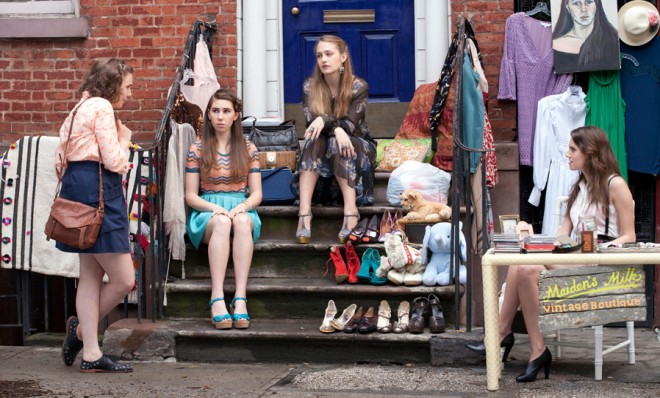Why there's nothing remarkable about a guy reviewing Girls
Many male critics insist on asserting their guy-ness before evaluating HBO's Girls. Please, stop


Earlier this week, Entertainment Weekly published a "Guys on Girls" review tackling the second season of the HBO dramedy. The article began with an introductory paragraph that warned the reader about "all the awkwardness you can imagine when two men try to talk about female issues." The article bears more than a passing resemblance to a format that Slate has used since Girls first premiered — separating the site's two weekly review roundtables into gender-divided articles called "Guys on Girls" and "Girls on Girls."
After two seasons of Girls (with a third on the way), it's time to drop the pretense that there's anything noteworthy about a guy reviewing Girls, along with the hand-in-hand implication that Girls is just for women.
We don't see similarly gimmicky review concepts like "Two and a Half Women on Two and a Half Men," or "Senior Citizens on The Secret Life of the American Teenager." And yet many male critics still begin their Girls reviews by asserting their guy-ness. Slate and Entertainment Weekly are certainly not alone; scads of male reviewers have positioned their articles on the series as "a dude's take on Girls" (including such noted critics as James Franco, who bravely admitted in a Huffington Post article that he "can get off on female bonding").
The Week
Escape your echo chamber. Get the facts behind the news, plus analysis from multiple perspectives.

Sign up for The Week's Free Newsletters
From our morning news briefing to a weekly Good News Newsletter, get the best of The Week delivered directly to your inbox.
From our morning news briefing to a weekly Good News Newsletter, get the best of The Week delivered directly to your inbox.
(Full disclosure: I reviewed each of Girls' 10 episodes this year. I don't think being a man played any role in my ability to judge the strengths and weaknesses of the show's second season. Feel free to judge for yourself whether I'm right.)
Critics of both genders evaluate films and TV shows that don't reflect their day-to-day experiences all the time (unless the rest of my fellow critics are secretly superheroes, or cops that play by their own rules). Part of being a worthwhile critic is developing the ability to objectively evaluate all kinds of art, and not just the art to which you can personally relate. There are times when it's worth bringing personal context into a review, but it should never be a requirement for writing one. Women have reviewed films and TV shows about men for decades without clarifying that their reviews are coming from a woman's perspective — because for good critics, it doesn't matter.
And even if you do believe a reviewer must be able to relate to the material he or she is critiquing, is it really that surprising or remarkable that a man could relate to the girls on Girls? I've never needed to schedule an abortion or been groped by a sleazy boss, but it's easy to empathize when the characters on Girls are put into those positions because I can imagine how painful and unpleasant those situations would be. Girls is doing its small part to counterbalance decades of male-centric TV shows, but its characters' problems — as they are in any quality piece of art — are essentially human problems.
Acting like there's something difficult about men empathizing with and relating to Girls undersells both the show and the male critics assigned to evaluate it. When the third season of Girls premieres next year, let's all agree to put the reductive "Guys on Girls" construction to rest, and prove that there's nothing remarkable about people — be they male or female — on Girls.
A free daily email with the biggest news stories of the day – and the best features from TheWeek.com
Scott Meslow is the entertainment editor for TheWeek.com. He has written about film and television at publications including The Atlantic, POLITICO Magazine, and Vulture.
-
 Syria’s Kurds: abandoned by their US ally
Syria’s Kurds: abandoned by their US allyTalking Point Ahmed al-Sharaa’s lightning offensive against Syrian Kurdistan belies his promise to respect the country’s ethnic minorities
-
 The ‘mad king’: has Trump finally lost it?
The ‘mad king’: has Trump finally lost it?Talking Point Rambling speeches, wind turbine obsession, and an ‘unhinged’ letter to Norway’s prime minister have caused concern whether the rest of his term is ‘sustainable’
-
 5 highly hypocritical cartoons about the Second Amendment
5 highly hypocritical cartoons about the Second AmendmentCartoons Artists take on Kyle Rittenhouse, the blame game, and more
